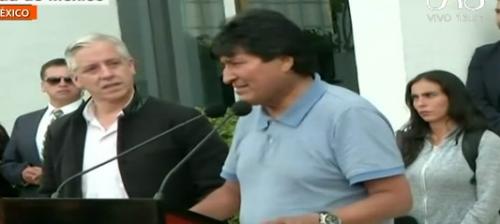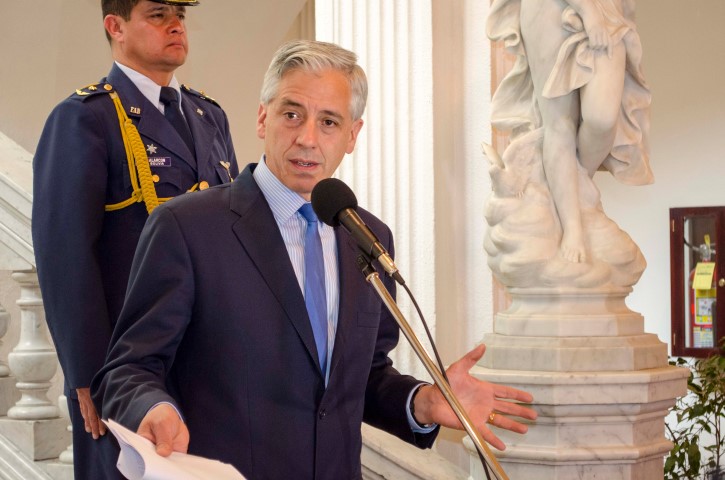The books of Alvaro
- Opinión

I first met Alvaro in a seminar in Mexico and we immediately established an empathy that continued to grow over the years. When I organized the Contemporary Encyclopedia of Latin America and the Caribbean, I asked him to write the introduction on Bolivia. He sent a fantastic text. (I am updating the Encyclopedia and will ask him to bring it up to date). I recall that with the payment that he received, Alvaro bought his first computer.
We always kept in contact; I followed him when Evo invited him to be the candidate for the Vicepresidency. I was present in the electoral campaign in 2005, I went to Bolivia with him. I recall that on the Saturday before the elections, we went to Santa Cruz de la Sierra. Already at the airport, various businessmen approached him, certain that he would be elected, attempting to contact him. On the return, there were no commercial flights, because there is no intercity public transport on election day. A Brazilian businessman, a soya producer, offered him his small aircraft. Alvaro accepted, but on condition that the same businessman would travel with us, to avoid any trap.
We were together on the day of the elections, observing the vote count. I recall Alvaro telephoning Evo, trying to convince him to go to La Paz to make a declaration as the President elect. Evo wanted to stay with his people in Cochabamba, but he agreed to come, made the declaration and returned to his people and his world.
I recall that we went with Alvaro to El Alto, the people wanted to hear him. Alvaro drove, contented, at over 100 kilometres per hour. He was received as a great leader and his speech was for the people of El Alto.
I returned for the swearing-in ceremony of Evo and Alvaro. In the morning, we had coffee in Alvaro’s apartment. In his declaration of assets to assume as Vicepresident, Alvaro declared his ten thousand books and his salary as University Professor: these were all the assets that he had. Evo arrived with bread, and we went to Tiahuanaco, the most ancient indigenous city in Bolivia, where Evo was to take the oath, before his formal investiture in La Paz.
We set off in a Kombi, Evo in jeans. But when the people, who were walking to the ceremony, discovered that Evo was in the car, they stopped him at every moment, he came out to embrace the people and conversed with them.
When we arrived, Evo left us and went to meet with indigenous authorities. I recall that I was seated in the first row of the great open space, with Eduardo Galeano. Suddenly Evo appeared in a great arc, wearing the clothes of the indigenous people, like a god.
Meanwhile indigenous women were cleaning the square in front of the Palacio Quemado (presidential palace), to receive their great leader. Evo and Alvaro finally took possession and began the most important governments in the history of Bolivia. I went to Bolivia regularly over the years. I had promised Evo, on one of these trips, to take him to see a football game in Maracaná, but I was not able to keep my promise, but I will do certainly so one day.
Whenever I met Alvaro in Buenos Aires, we made a tour of book stores, in his official car, operations that were devastating due to the quantity of books that he bought. I always recalled with him, the itinerary of book shops. And the booksellers identified me as Alvaro’s friend. After completing the operation at the last moment, I would accompanied him, with the car full and heavy, to the military airport, from whence the small aircraft would leave for La Paz. Whenever I went to see him in Bolivia, I always brought him books. When he got married, Alvaro left his modest and small apartment, where he fitted in with great difficulty, for a bigger house, where he could store all of his books, his library in constant and unstoppable growth.
Alvaro, the best and most important contemporary Latin American intellectual, accompanied me, in turn, with my mandate as the Executive Secretary of Clacso. I am proud to have had the Bolivian process as the most important political process during the time of my mandate. We have published in Clacso–as well as in Brazil as well–a large number of Alvaro’s books.
The Evo-Alvaro double ticket was a perfect combination. The article of Alvaro on indigenism and Marxism is a masterpiece, a brilliant update of the work of Mariátegui, a theoretic work of cleaning the field, indispensable for the rise of Evo as a leader and the comprehension of the Bolivian phenomenon.
We always spoke by telephone, especially in the most decisive moments in the history of Bolivia. I brought him to Brazil for the launching of his book La potencia plebeya. I he gave a conference in the UERJ, and I was able to show him a bit of Rio de Janeiro.
Recent times, both here (in Brazil) and there (Bolivia), were turbulent. I followed the situation with great anxiety, looking for new news directly or through his faithful cabinet chief, Héctor. I sent him news of Brazil and asked him for their news.
And so the events have been infernally precipitated and the Bolivian process ended up in their resignation from the government, in order to avoid a massacre. I see the photo of Evo and Alvaro arriving in Mexico and, simultaneously, the news that they have not only sacked the house of Evo, but also that of Alvaro and they have burned his thirty thousand books. I can imagine, in addition to the sorrow for everything going on in Bolivia, this additional sorrow for Alvaro.
But do not worry, Alvaro. We will rebuild your library, book by book, in Mexico, in Argentina, in Brazil, in France, wherever. Just as Bolivia will recover its democracy, the plurinational regime, the power of the people. Evo and you will return to the arms of the people, as Lula has recuperated his freedom in the arms of the people.
12/11/2019
(Translated for ALAI by Jordan Bishop)
- Emir Sader, Brazilian Sociologist and Political Scientist, is the Coordinator of the Laboratorio de Políticas Públicas de la Universidad Estadual de Rio de Janeiro (UERJ).
Del mismo autor
- Hay que derrotar políticamente a los militares brasileños 07/04/2022
- China y Trump se fortalecen 04/03/2022
- Pandemia e Ucrânia aceleram decadência da hegemonia norte-americana no mundo 28/02/2022
- Pandemia y Ucrania aceleran la decadencia de la hegemonía norteamericana en el mundo 28/02/2022
- La anti-política generó la fuerza de extrema derecha 22/02/2022
- Las responsabilidades del PT 10/02/2022
- Estados Unidos, más aislado que nunca en América Latina 03/02/2022
- Memoria y olvido en Brasil 27/01/2022
- 2022: tiempos decisivos para Brasil y Colombia 05/01/2022
- Brasil: una historia hecha de pactos de élite 18/12/2021
Golpe en Bolivia
- Baptiste Mongis 15/10/2020
- Hugo Moldiz Mercado 24/09/2020
- Daniel Espinosa 17/08/2020
- Rafael Bautista S. 17/08/2020
- Arnold August 13/08/2020

